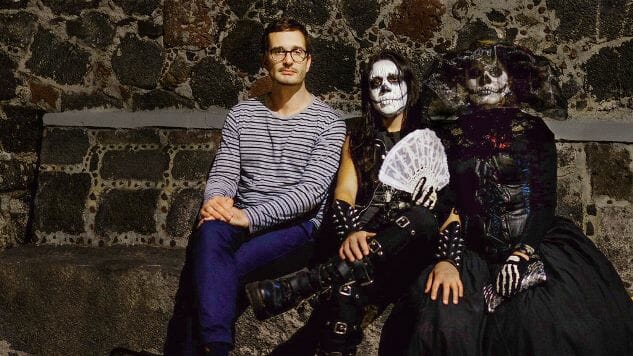Tickled‘s David Farrier Seeks Out Danger in Dark Tourist

It’s a weird move to make your go-to party movie a documentary about identity theft and young boys being sucked into the world of competitive tickling, but that’s a cosmic shift that has completely rebuilt the very foundation of our home. If you haven’t taken the time to fire up Tickled, get an HBO Go login (or rent it on Amazon) and take care of that right now. It’s an otherworldly trip that shifts the focus of a true crime investigation to a new subject, and almost completely different movie, every ten to fifteen minutes. I’m genuine in that suggestion: there’s almost nothing I can recommend as highly as this film, and the less you know about it, the better.
Showing friends the documentary TICKLED! for the first time. Going about as expected.@davidfarrier@TickledMoviepic.twitter.com/ZPkbw4zN1q
— ‘Tis the Treason! (@brockwilbur) July 4, 2018
David Farrier is your guide through Tickled, because he’s the investigative journalist from New Zealand who found himself inserted into the story, and later, attempting to resolve the mystery before he could be obliterated by a lawsuit. The film thrives because of his charm and unending curiosity, and so it makes sense that his next project would transpose this same dynamic into a format that would allow Farrier to have more genuine fun. Which is easy to do when, you know, the subject you’re documenting isn’t threatening your life.
That brings us to Dark Tourist: Farrier’s new Netflix series where each episode he actively seeks out a new way for his life to be threatened. Ah. Okay. I see how that’s very similar. Classic Farrier. That’s good by me.
The show came out on Netflix today, and yesterday I got to chat with Farrier, which was a big deal. The way Farrier looks to comedic documentarian Louis Theroux is how I look to Farrier, and I made it super weird by opening the interview by letting him know that. After he brushed off my gushing we got down to a discussion of what Dark Tourist is all about.
Dark Tourism is the rising international trend of seeking out places and experiences that put the adventurer in or around danger. For Farrier, that takes the form of visiting irradiated sites, taking part in tribal rituals, befriending assassins, and touching a dead body. If it sounds like some of that is exploitative White People Nonsense, that’s because it is, and Farrier is aware. Because the show doesn’t just capture the experiences of this self-endangerment, it captures the nonsense of the type of person who is a dark tourist, and how that draw makes people act terribly.
“No matter where we were in the world, even in places where you do not see anyone having access to the sort of technology or services the rest of us are used to, there was always like six people streaming the event on Facebook Live,” Farrier says. “It’s not always easy to tell who the dark tourists are. And when you’re dealing with the morally bankrupt world of people who want to pay to be in a warzone, not to help people but just to experience being shot at, well there are places where we had to decide whether or not viewers would even want to spend time with these characters. There’s a mix of showing you something you probably don’t know about and having worthwhile people to meet, but also not getting ourselves killed in the process.”
-

-

-

-

-

-

-

-

-

-

-

-

-

-

-

-

-

-

-

-

-

-

-

-

-

-

-

-

-

-

-

-

-

-

-

-

-

-

-

-








































